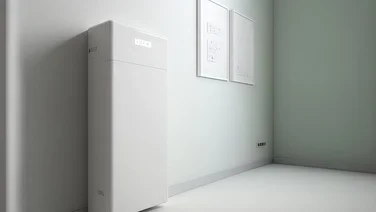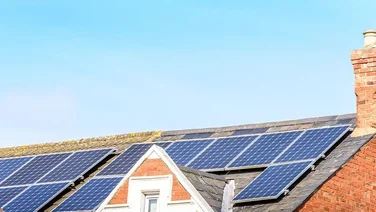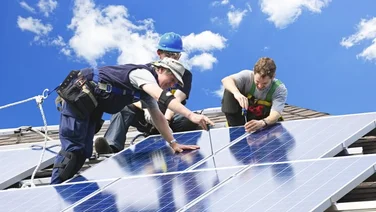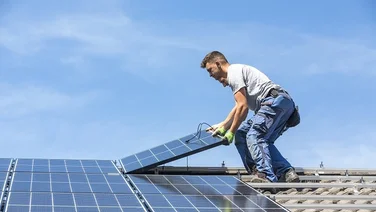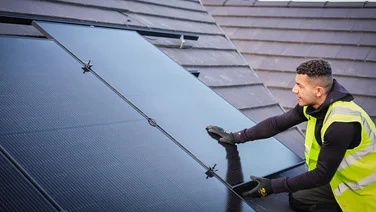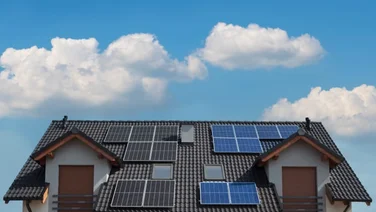We receive a small fee from trusted installers when you request a quote through our site. This helps us keep our content independent, well-researched and up to date – Learn more
✔ Solar panels are not currently mandatory on new builds in the UK
✔ Solar PV can help new homes achieve a better rating in their EPC rating
✔ National energy policy for built environment is currently under consultation
Solar photovoltaic (PV) panels are one of the key ways new homes being built in the UK can create more environmentally-friendly development, support national energy security, and help us hit net zero carbon targets. And with the cost of solar panels reducing by 82% since 2010, it’s never been a better time to invest.
In this article, we’ll cover whether it’s compulsory to install solar panels on new build homes, run through the benefits of having solar panels on your property and explain how they can affect your home’s environmental credentials.
Considering installing solar panels on your property? Compare prices by entering a few details in this short form, and our expert installers will get back to you with bespoke quotes.
Where do you want to install solar panels?
Get started
Do all new build homes need to have solar panels?
Under the current planning regime in the United Kingdom, there is no mandatory requirement for new builds to include the use of solar panels.
That being said, new builds do have a requirement by law to incorporate energy-saving measures. This is governed by something called the SAP (Standard Assessment Procedure) regulations. SAP is the only official means of assessing a new build’s energy rating – which is then outlined in an EPC (Energy Performance Certificate). EPCs can only be produced by accredited assessors.
The government needs to keep track of a building’s energy performance in order to track national progress on environmental initiatives and targets. Installing energy-saving measures, such as rooftop solar panels or air source heat pumps, help new builds to achieve a better EPC rating. Check out: The 9 Best Solar Panels in the UK.
SAP regulations explained
The SAP regulations outline the methodology through which a building’s EPC is determined. The most recent version of the regulations came into force via the Building Regulations in June 2022 for newly built dwellings. Under current building regulations, a SAP calculation and predicted EPC must be submitted before construction can start. The purpose of SAP regulations is to deliver the UK government’s key energy and environmental policies. This includes the current target to achieve carbon net zero by 2050.
The SAP regulations work by assessing the amount of energy a property will consume in order to provide a suitable level of comfort and services. Dwellings receive a score of 1 to 100+ for energy usage based on standardised calculations of:
- The installed heating and hot water system
- Internal lighting
- The building structure and materials used
- The use of any other renewable technologies in the home
The higher the score, the more energy efficient the property and the lower the cost to run the household. Buildings that achieve a score of over 100 are classed as net exporters, which means they export excess electricity to the grid and have zero energy costs.
How can a new build get a good SAP score?
The use of different construction techniques, environmentally-friendly heating systems and energy-saving materials can all support a new build to achieve a good SAP score, and therefore a better EPC rating.
Including solar panels in your new build is a great way to get a good SAP score. Solar PV is simple to install, provides a source of reliable renewable energy and doesn’t really affect the overall architectural design of a property.
Other ways of getting a better SAP score include:
- Installing low-energy lighting throughout a dwelling
- Using high-performance windows that keep homes warm in winter and cool in summer
- Designing the fabric of the build to minimise heat loss from the walls and roof
- Installing an energy-efficient boiler or air source heat pump
- Introducing electric heating controls that provide regulating options such as temperature-controlled zones
- Ensuring the building is as airtight as possible
Where do you want to install solar panels?
Get startedBREEAM scores explained
BREEAM, the Building Research Establishment’s Environmental Assessment Method, is a sustainability certification scheme for the built environment. It is used to reduce the environmental credentials of new builds and award those with a low impact.
There are a number of principles underpinning BREEAM, similar to SAP regulations, including low-impact design, reduced carbon emissions and ecological value. The BREEAM framework has been designed to support the delivery of sustainable, environmentally positive and high-performing new dwellings.
The highest rating for BREEAM is Outstanding, followed by Excellent, Very Good, Good and Pass. Scores are reflected by awarding stars on the BREEAM certificate.
How can a new build get a good BREEAM score?
To achieve the highest accolade of a BREEAM Outstanding rating, a new build needs to score over 85%. Installing solar panels is a great way to achieve a decent score.
BREEAM has 10 environmental performance categories, including energy, water, materials, waste and pollution. Credits are given across all 10 sections, which in turn have different weightings, to provide an overall score.
At the very start of the design process for a new build, the main factors in environmental impact should be identified so that the design brief meets the minimum standards. In order to get a good score, new builds need to:
- Include low-carbon and renewable energy technology, for example, solar panels
- Incorporate energy efficiency in the materials used, such as LED lighting
- Invest in carbon offsetting for your build
- Ideally, achieve the highest EPC rating of ‘A’

Will solar panels ever become mandatory for new builds?
The UK government has been working on the next version of SAP, known as SAP 11, which will focus on achieving net zero carbon emissions for buildings. SAP 11 will come under further consultation before coming into force in 2025 alongside another update of the Building Regulations, the Future Homes Standard.
A survey conducted by YouGov during initial consultation on SAP11 found that seven out of 10 MPs would support the introduction of mandatory solar panels on new builds as part of the Future Homes Standard (13% said they would oppose this).
With an election on the horizon in the UK, it’s worth bearing in mind how a change in government leadership could affect climate-related policies. In March 2023, shadow climate secretary Ed Miliband hinted that a Labour government would require solar panels to be mandatory on all new builds.
Are there any countries where solar panels are mandatory for new builds?
Various places around the world have already taken the decision to make solar panels a mandatory requirement on new builds, including the heavily-populated Tokyo in Japan from 2025.
European Union member states have agreed to implement mandatory solar panels on new builds from 2029, but this is yet to receive approval in European Parliament. Rooftop solar PV is already a requirement on new dwellings in a number of German states.
Do solar batteries also help with SAP scores?
Solar batteries store excess solar energy, allowing it to be deployed when needed. In theory, this creates a home that produces fewer carbon emissions than one without battery storage technology.
As SAP calculates the running costs of a property, the less that is spent on electricity generation the better. Solar and battery can also support electric car charging points, as typically people charge their vehicles overnight when panels are not generating power.
Next steps
Solar panels are a quick, cost-effective and easy way to improve the energy efficiency credentials of a new build. As well as supporting a better SAP score and therefore EPC rating, the use of renewable technology such as solar is also in line with BREEAM’s environmental principles.
Incorporating solar PV helps create sustainable properties that save residents money while producing low-carbon electricity.
Want to compare solar panel prices? Simply enter a few details in our quick and easy form, and our expert installers will get back to you with several quotes relevant to your needs.
FAQs
How do solar panels work in new builds?
Solar photovoltaic, or PV, panels work by absorbing the energy from the sun and converting it via the use of transformers into AC electricity, which can be used to power most home appliances.
Do I need to tell my energy company I have solar panels?
Local electricity supplies in the UK are usually managed by distribution network operators (DNOs) who own and operate the grid connection wires. It is advisable to let your local DNO know as otherwise you will not be able to export any excess electricity produced to the grid, which you can make money through. Find out who your DNO is here.
Do you need a building regulations certificate for solar panels?
Installing solar panels is usually classed as ‘permitted development’ and therefore applying for planning permission is not required.
However, as with most structural home improvements, to install panels on your home you may need to apply for the building regulations certificate and present this to your local authority before commencing the work.
Check with your local authority for more information.

